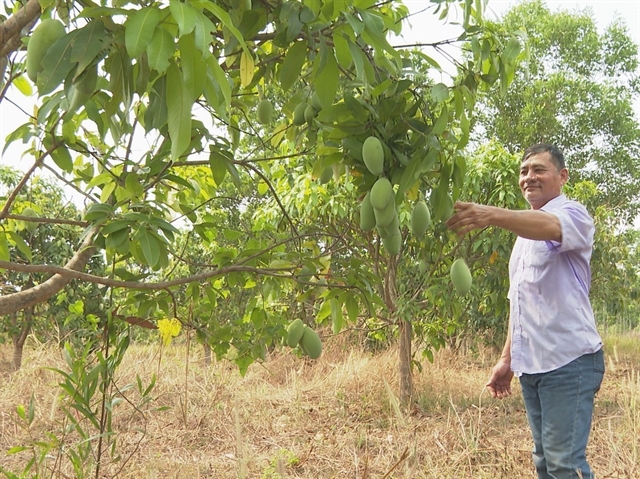 Society
Society

 |
| Nguyễn Thanh Sơn’s keo mango orchard in Lộc Ninh District’s Lộc Thạnh Commune. – VNA/VNS Photo K GỬIH |
BÌNH PHƯỚC – The cultivation of keo mango in unfertile soil in Lộc Thạnh Commune in the southeastern province of Bình Phước has helped farmers have stable incomes.
Located in Lộc Ninh District, which borders Cambodia, the commune has unfertile soil and normally lacks fresh water in the dry season, but local farmers have found keo mango, a Cambodian mango variety, is suitable for growing here.
Nguyễn Thị Kim Chi, a local farmer, bought keo mango seedlings from Cambodia to grow in 2014 and they have developed well.
In 2019, some other local farmers begun growing the fruit, then Chi and 20 other farmers established the Tân Lộc Thạnh Fruit Co-operative and planted the fruit on a total of 38ha.
Nguyễn Thanh Sơn, a co-operative member, has planted the mango on more than 1ha for four years and now has a harvest output of 6-7 tonnes a year.
His mango trees are planted on dry and pebbled soil but they have yields higher than other plants which were grown previously, he said.
The mango is less affected by disease, and local farmers grow it without using chemicals and do not need to irrigate it in the dry season.
The mango begins to have fruit after 16-18 months of growing and has two harvests a year.
Keo mangos weigh 250-400 grammes and are preferred by consumers as they can be eaten raw or ripe, have light sweet flesh and their prices are not expensive.
It is sold at orchards at a price of VNĐ6,000 - 8,000 per kilogramme.
Nguyễn Thành An, who has a 1.5ha keo mango orchard in Thạnh Phú Hamlet, said: “Local people call keo mango 'poverty reduction' fruit as it is easy to grow, requires low production cost and has stable harvests.”
“The profit of growing this mango is not higher than other fruits but it is a suitable tree for growing on the poor soil and harsh weather here,” he said.
Chi, acting manager of the co-operative and owner of 15ha of keo mango, said the fruit does not require much tending and grows well in the commune.
Farmers do not use chemicals to grow it, she said.
“The co-operative’s keo mangos are clean and safe for consumers,” she said.
The co-operative plans to invite more farmers to join it and expand the growing area to 50ha next year.
It aims to make the co-operative’s fruit recognised as a product of the country’s “One Commune – One Product” programme.
Nguyễn Thị Bắc, chairwoman of the Lộc Thạnh Commune Farmers Association, said the cultivation of keo mango in the commune meets the standards of OCOP products.
“The association will co-operate with competent agencies to assist the co-operative to develop the mango into an OCOP product, so it can expand and develop cultivation sustainably,” she said.
The commune has encouraged farmers to expand growing the fruit according to its zoning plan. – VNS




